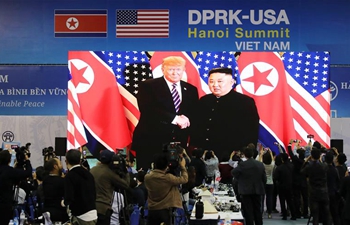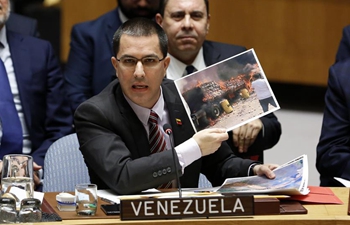SANAA, Feb. 28 (Xinhua) -- Yemen's Houthi rebels said that they are ready to withdraw unilaterally from the ports of the Red Sea city of Hodeidah if requested by the United Nations, a statement released by Houthi-controlled Saba news agency said late Wednesday.
"We are ready to continue to implement the agreement unilaterally if the UN requested that," Saba quoted Mahdi al-Mashat, president of the Houthi-run Supreme Political Council, as saying.
The remarks came when al-Mashat spoke to visiting UN Special Envoy to Yemen Martin Griffiths.
Griffiths left the rebel-controlled capital Sanaa early on Thursday after a two-day visit to push the Houthis toward the withdrawal from Hodeidah ports in line with the Stockholm Agreement.
On Tuesday, the rebels allowed a UN aid team's access to the Red Sea mills, where about 51,000 tons of grain aid stored in the besieged mills that are enough to feed 3 million needy Yemenis.
The move appeared as a goodwill and confidence building for the settlement of Hodeidah stalemate.
A Houthi source close to the negotiations told Xinhua on anonymity that Griffiths flew to the Saudi capital Riyadh for talks with the exiled government of President Abd-Rabbu Mansour Hadi.
Another Houthi source told Xinhua on anonymity that the withdrawal of their forces could begin next week.
Government officials did not respond to a Xinhua request for comment.
Griffiths has been shuttling between the Houthi rebels in Sanaa and the exiled government in Riyadh to avert an all-out deadly fighting in Hodeidah, the lifeline of the country's most commercial imports and humanitarian aid.
On Monday, Houthi spokesman Yahya Sarea said that their forces will not withdraw until a date is specified for the withdrawal of their foe Saudi-backed Yemeni government forces from the southern edges.
The warring parties reached a peace deal in Stockholm last December. They have largely held the cease-fire deal in Hodeidah since it went into force on Dec. 18 last year.
However, both warring sides have since delayed the implementation of troops' withdrawal for several times.
According to the deal, the troops' mutual withdrawal should go through two timeline phases starting from the ports of Ras Isa, Saleef and Hodeidah's main port and concluding with full withdrawal from inside and around the city.
The deal seeks to save more than 20 million Yemenis from sliding into major starvation.
Saudi Arabia is leading an Arab military coalition that intervened in Yemen in March 2015 to support the government of Hadi after Houthi rebels forced him into exile and seized much of the country's north, including the capital Sanaa and Hodeidah port city.
The four-year civil war has killed more than 10,000 people, mostly civilians, displaced 3 million others, and pushed the country to the brink of famine.

















